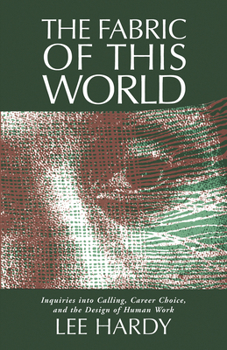Fabric of This World: Inquiries Into Calling, Career Choice, and the Design of Human Work
Select Format
Select Condition 
Book Overview
An in-depth historical, philosophical, theological--and practical--exploration of work from an evangelical perspective. Hardy discusses several historical views of work from the ancient Greeks onward, highlighting the Christian concept of vocation as articulated by Luther and Calvin; these expositions lead to practical applications regarding the personal issue of career choice and the important (but often neglected) social issue of job design.
Format:Paperback
Language:English
ISBN:0802802982
ISBN13:9780802802989
Release Date:May 1990
Publisher:William B. Eerdmans Publishing Company
Length:231 Pages
Weight:0.66 lbs.
Dimensions:0.7" x 5.4" x 8.4"
Customer Reviews
4 ratings
Thoughtful Treatise on the Lost Concept of Vocation
Published by Thriftbooks.com User , 15 years ago
Here is an excerpt from pages 97-99 I read today. I think it speaks for itself. "... the constant temptation is to evaluate a job solely on the basis of salary, security, status, and satisfaction -- all, oddly enough, benefits which accrue directly to ourselves. Certainly adequate pay, financial stability, a measure of social dignity, and a sense of vocational fulfillment are significant considerations in applying for jobs. But the most important consideration for the Christian is service. Those who belong to the household of faith, Calvin counsels, should "choose those employments which yield the greatest advantage to their neighbors." As Christians, we are obliged to evaluate a job by its actual social content -- the way in which it benefits, or harms, others. For God "let us in this world," Calvin adds, "on the condition that every one of us should consider wherein he may be able to help such as have need of him." Because of the effects of sin upon the institutional shape and social direction of work, we cannot automatically assume that all existing occupations are equally legitimate, nor can we assume that the highest paying ones are the ones that fill the greatest and most important needs. Nor can job satisfaction serve as an infallible guide to the right occupation. Much is made these days of self-fulfillment. We must to our own selves be true. When it comes to work, we are inclined to think that jobs exist primarily for our sake, to assist us in the realization of our selves. This is what we expect from a good job. If it happens that others are served or edified in the process, then so be it -- we will count it as a happy by-product. If, however, we find our work unsatisfying, then even if we are serving others in it, we take ourselves to be entirely justified in quitting. The Christian understanding of work does not deny that job satisfaction is a good and valuable thing. But job satisfaction cannot, for the Christian, serve as the sole or even primary criterion by which a job is evaluated. For an occupation must be first considered in terms of how it provides a fitting place for the exercise of one's gifts in the service of others. If job satisfaction comes along with the work, then one must count that as a blessing and be thankful. But it cannot be a goal. "The greatest reward of faithfulness to vocation," writes Barth, is to be able to devote ourselves to our concern no only with interest but with desire and love, with gladness that we are what we are. But this is a reward which we cannot expect nor demand, and at which we are not to aim. Our task is to do justice to what is demanded at the place which we have occupied, whether gladly or otherwise. Yet these may not be absolute alternatives. There will always be exceptional cases of men who can gladly fulfill their sphere of operation from first to last and in all its dimensions; just as there will always be those who do so with the greatest reluctance. For most of us the reality wil
A true comprehensive view of work.
Published by Thriftbooks.com User , 15 years ago
Lee Hardy gives a fascinating exploration of work, the origins, and the movements that lead up to now. Without context, our calling and understanding of work, even for God, will remain hollow. Lee Hardy takes the reader back into the ages, and into modern day. While intellectual, it is easy to read, stimulating, and brings a wide scope of perspective. While he is an evangelical christian, he has a great open view of how each era, and labor movement, had some good and bad points. In this economic climate, its a good read to understand where America's roots came from. And I appreciated his exhaustive research.
A Must-Read
Published by Thriftbooks.com User , 15 years ago
This book is not just about human work. It is a theological reflection on what it means to be a human being created in God's image. Though I read it for my seminary course titled "Faith at Workplace," I highly recommend it as a must-read not only for theology students but also for all those who are serious about taking their faith into the workplace.
a good Christian book on vocations
Published by Thriftbooks.com User , 24 years ago
I liked this book. We have to read it for our class on career counseling and it gives a good primer on the theology of work--really the history of the theology of work. From the ancients to the reformers of Calvin and Luther. Chapter four details the modern thinkers on work and management. A good read overall.





